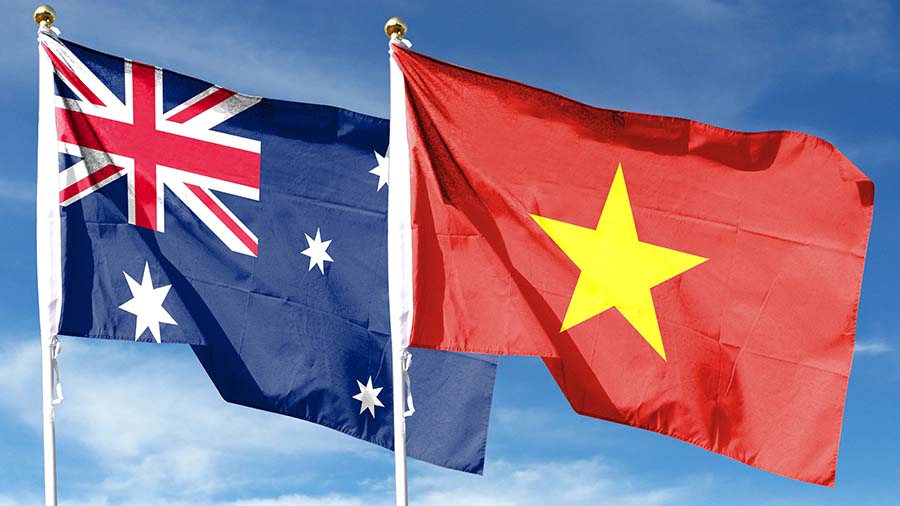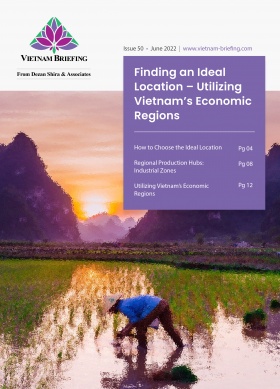Vietnam Introduces Administrative Sanctions for Environmental Violations: Decree 45
The Vietnamese government recently issued Decree 45 in July 2022, regulating fines in the field of environmental protection. The Decree is a step in the right direction as Vietnam transitions to a green economy, showing serious commitment to environmentally responsible practices as is effective August 25.
In July, the Vietnamese government, with an aim of reinforcing environmental compliance and responsibility on every level, issued Decree 45/2022/ND-CP (Decree 45) on sanctions of administrative violations against environmental protection. The Decree will enter force from August 25, 2022, and apply to all domestic/foreign individuals/organizations of all forms (enterprises, investors, non-business units), household/business households, and residential communities.
The sanctions apply to violations against:
- Regulations on environmental registration/assessment/permits;
- Environmental protection in commercial activities;
- Causing environmental pollution including air, water, and land pollution;
- Improper waste management;
- Improper destruction or disposing of machinery;
- Improper control of noise and vibration;
- Improper exploitation of natural resources, and
- Improper development of genetically modified organisms (GMO).
Vietnam Briefing explores the key elements of Decree 45 and how businesses can effectively comply with the required regulations.
Decree 45 highlights: Sanction categories, forms, and levels
Decree 45 sanctions in four main categories: warning, monetary fine, additional sanctions, and restoration measures.
The fine at its maximum is VND 1 billion (US$42,808) for individuals and VND 2 billion (US$85,616) for organizations. A point to note is that, for the same violation, organizations are subject to fines two times higher than individuals.
The additional sanctioning forms include but are not limited to suspended rights to use environmental permits and certain resources, suspension of operations for up to 24 months, and confiscation of companies’ assets and products that contribute to pollution.
Besides fines and additional sanctions, individuals and establishments may also be forced to take actions to restore the damaged area, destroy low-standard machinery, or get their projects relocated. These measures can be combined, depending on the degree of violation.
There are 49 types of violations as per Decree 45, each with different levels of fines and accompanying measures. We highlight key sanction categories that businesses should be aware of.
1.)Violations against regulations on environmental registration/permits, environmental impact assessment (EIA) for establishments required to make EIA reports:
- A fine between VND 10-15 million (US$428-642) under the provincial authority, and between VND 20-30 million (US$ 856-1,284) under MoNRE, will be imposed if businesses fail to submit the environmental registration on time and fail to cover all waste types/volumes and plans for waste management;
- A fine ranging from VND 5 million (US$214) up to VND 1 billion (US$42,808) will be imposed for failure to report content changes to the license, failure to disclose environmental permit, improper implementation of contents in the permit, failure to upgrade/amend treatment instruments, building waste lines or pipes to discharge untreated waste into the environment; and
- A fine ranging from VND 10 million (US$428) to VND 100 million (US$4,280) will be imposed for failure to notify in writing the results of environmental protection work to authorities, failure to disclose the EIA report, failure to implement, or improperly implement contents of the decision approving the EIA report.
2.)Violations against regulations on the discharge of wastewater containing hazardous elements exceeding the relevant regulations:
- For any wastewater discharge exceeding technical regulations, depending on the quantity discharged per day and the pH concentration, a warning will be issued or a fine ranging from VND 1 million (US$ 42.81) to as much as VND 1 billion (US$ 42,808);
- In addition to the fine, violators may be subject to additional sanctions including suspension of operations for three to six months, the right to use environmental license revoked, and the suspension of operations.
3.)Violations against regulations on the discharge of dust and emissions containing hazardous elements:
- A fine ranging from VND 10 million (US$428) to VND 1 billion (US$42,808) will be imposed on any dust or gas emissions exceeding technical regulations with repeated violations, depending on the quantity emitted per hour;
- The emission of dust and gas containing radioactive elements is subject to a fine from VND 950 million (US$40,667) to VND 1 billion (US$42,808); and
- Additional sanctions and other measures similar to the case of wastewater discharge may also be imposed.
4.)Acts of polluting land, water, and air; long-term environmental pollution:
- A fine between VND 40 million (US$1,712) and VND 150 million (US$6,421) will be imposed for the discharge of common and hazardous environmental parameters into the land and water environments against the relevant regulations; and
- Additional sanctions may be imposed, including suspended operations of the establishment for up to nine months, with the right to use an environmental permit revoked for up to nine months.
5.)Violations against regulations on classification, collection, burial, dumping, burning, and treatment of ordinary solid waste:
- A fine of between VND 500,000 (US$21.4) and VND 1 million (US$42.81) will be imposed on individuals and households for failure to sort domestic waste or failure to use the proper wrap for domestic solid waste as per regulations.
- A fine of between VND 20 million (US$856) to VND 30 million (US$1,284) will be imposed on organizations, and business/service establishments for failing to classify solid waste at the source, store unqualified solid waste at warehouses, fail to sign contracts with waste collection units, and fail to keep different types of industrial solid waste separate; and
- Additional sanctions and other measures may be imposed, if necessary.
6.)Violations against regulations on manufacturer’s or importer’s responsibility for products/packages recycling and waste treatment:
- A fine between VND 50 million (US$2,140) and VND 100 million (US$4,280) will be imposed for failure to disclose information about the products and packages they manufacture or import; and
- A fine between VND 250 million (US$10,702) to VND 450 million (US$19,263) will be imposed for delays less than 91 days in registering for a recycling plan or submitting the declaration of the contribution to recycling and waste treatment. A fine of up to VND 1 billion will be imposed for delays of over 91 days.
7.)Violations against regulations on environmental protection on the import of machinery, vehicles, raw materials, and fuels:
- A fine between VND 100 million (US$4,280) and VND 200 million (US$10,702) for importing machinery, equipment, raw materials, and fuels that either fail to meet technical regulations or cause pollution; and
- Additional sanctions: suspension of the establishment’s importing activities for up to nine months.
8.)Violations against regulations on environmental protection in agricultural production:
- A fine of VND 3 million (US$128) will be imposed for the outdoor burning of crop by-products near residential areas, airports, and traffic routes;
- A fine of VND 30 million (US$1,284) to VND 50 million (US$2,140) will be imposed for failure to make an assessment of chemicals, pesticides, and veterinary drugs as prescribed and a fine of VND 50-70 (US$2,140-US$3,000) million for using expired pesticides, veterinary drugs, chemicals, or those not permitted by law; and
- A fine of VND 50 million (US$2,140) and VND 100 million (US$4,280) will be imposed for importing chemicals or pesticides containing hazardous elements that violate regulations on environmental protection.
Businesses should adjust their operations to comply with Decree 45
Although regulations on environmental protection in economic activities have been established for a while, Decree 45 further affirms the government’s commitment to restrict any activity likely to degrade the environment.
Economic establishments should pay close attention to their waste treatment system and make sure to register for any required permit/license to avoid heavy penalties. Emphasis must be placed on regular check-ups on solid waste, wastewater, and gas emission control and treatment while constant upgrades of the current waste treatment/assessment technologies are necessary.
Businesses should also be aware of the requirement to classify waste at the source as regulated by Decree 45.
Any imported goods, raw materials, and chemicals should be thoroughly examined for possibilities of causing environmental damage before entering Vietnam as there are serious penalties for any environmental pollution.
Given the emphasis on waste treatment as per the Decree, investors may take the opportunity to make investments in waste management, drainage, waste sorting, and environmental assessment technologies as the demand for systems that meet government standards are likely to be in demand as the Decree enters force.
Takeaways
Decree 45 is the new steering wheel of Vietnam’s strategic development toward environmental sustainability on all levels, from individuals to economic establishments. It indicates Vietnam’s determination to become a leading country in both economic development and environmental preservation in the region.
For further insights on how to effectively adjust operations to comply with environmental protection regulations and avoid severe penalties while leveraging key resources, investors can contact our experts for an in-depth discussion.
About Us
Vietnam Briefing is produced by Dezan Shira & Associates. The firm assists foreign investors throughout Asia from offices across the world, including in Hanoi, Ho Chi Minh City, and Da Nang. Readers may write to vietnam@dezshira.com for more support on doing business in Vietnam.
We also maintain offices or have alliance partners assisting foreign investors in Indonesia, India, Singapore, The Philippines, Malaysia, Thailand, Italy, Germany, and the United States, in addition to practices in Bangladesh and Russia.
- Previous Article Russia’s Renewable Energy Investment in Vietnam: New Projects Underway
- Next Article Vietnam’s Cold Storage Industry: Drivers, Challenges and Market Entry






























